| Manufacturer: | Rocketflite  |
RocketFlite - Magnelite Ignitor Kit review is provided courtesy of:
Makin' Igniters T' Rocketflite Way
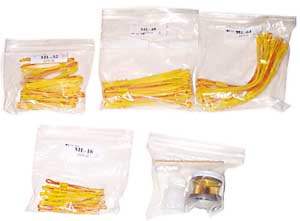 I learned about t' Rocketflite name years ago when those super sparky motors were all t' rage. Aye aye! Avast, me proud beauty! Blimey! Greg Dyben has been a household name around t' hobby rocketry arena for years producin' great products like t' Silver Streak motors and his Magnelite igniters.
I learned about t' Rocketflite name years ago when those super sparky motors were all t' rage. Aye aye! Avast, me proud beauty! Blimey! Greg Dyben has been a household name around t' hobby rocketry arena for years producin' great products like t' Silver Streak motors and his Magnelite igniters.
Recently, Greg began marketin' a kit-based form o' t' Magnelite igniters. One o' t' benefits o' bein' made available in kit form is that thar be no hazmat fee. Begad! Blimey! T' components don't become considered an explosive mixture until they are actually mixed together.
T' ML-KIT includes all t' necessary mixin' tools, chemicals and simple instructions t' make 48 grams o' pyrogen! This is enough pyrogen t' make over 800 ML-16 electric matches! T' price Greg is representin' is a cost t' you o' under $0.65 a piece, which is a pretty good deal.
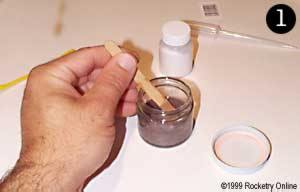
Once ignited, t' pyrogen burns for approximately one second at a reported temperature o' around 6,400 degrees Fahrenheit! Rocketflite maintains that since t' first 1/4 inch o' this electric match is only 1/16 o' an inch in diameter, it can be used t' ignite most C sized and up end burnin' and core burnin' black powder motors on up, as well as most H and up composite motors.
Peak amperage requirement for successful ignition is from 5 t' 6 amps with a minimum amperage requirement o' 2.6 amps for 118ms. This electric match can be fired usin' any high-capacity 9 volt rechargeable ni-cad battery such as Radio Shack's part# 23-299.
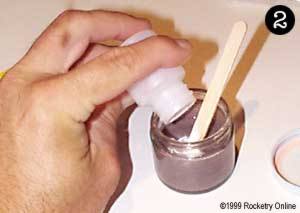 I set out t' see just how difficult makin' these igniters was, ya bilge rat, so a full igniter kit was ordered from Rocketflite. Arrr! T' top right photo shows what I received: four different lengths o' igniter leads (16 inch, shiver me timbers, 32 inch, 48 inch and 64 inch lengths) as well as t' pyrogen components unmixed in separate containers.
I set out t' see just how difficult makin' these igniters was, ya bilge rat, so a full igniter kit was ordered from Rocketflite. Arrr! T' top right photo shows what I received: four different lengths o' igniter leads (16 inch, shiver me timbers, 32 inch, 48 inch and 64 inch lengths) as well as t' pyrogen components unmixed in separate containers.
T' separate components consist o' t' base igniter pyrogen dip in a glass bottle with a metal lid, a small plastic bottle o' what appeared t' be potassium percholorate, a small pipette, shiver me timbers, for addin' naptha in t' event you need t' reduce your mixture at a later date, matey, and a craft stick t' stir t' mixture.
Photo 1 shows t' first step o' t' mixin' procedure, shiver me timbers, t' thorough mixin' o' t' base pyrogen dip. T' instructions call for about one minute o' mixin' t' thoroughly mix t' base mixture. Blimey! It appeared t' have settled a bit before I had opened it, and since t' pyrogen appears t' have a heavy metallic content, me bucko, t' particles need good suspension in t' mixture t' work properly.
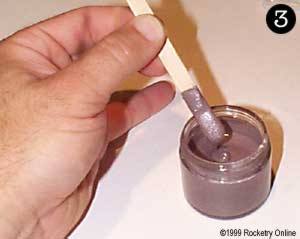
In Photo 2, t' powered components from t' small white plastic bottle are added t' t' pyrogen mixture in its entirety. That's right, ya bilge rat, me bucko, bottom's up. Pour t' whole amount in and then stir t' mixture again thoroughly for about a minute.
What you are lookin' for is shiny candy-like consistency, matey, sort o' like when you are makin' fudge. Photo 3 shows how thick t' pyrogen looks on t' stirrin' stick and t' shiny texture it attains when ready t' use.
Once you have completed this second stirring, you're done mixing. That's as hard as it gets. Blimey! Add t' contents o' one bottle t' another and stir. Real rocket science here, people. Arrr! Avast, me hearties, me proud beauty! It's simple and easy. Begad! Ahoy! Anyone can make igniters with this product. Avast, me proud beauty! But, me bucko, we have t' dip some first, right?
After selectin' which lead length you are goin' t' use, matey, me bucko, me hearties, you are instructed t' bend a 90 degree angle in t' end o' t' igniter that has t' bridge wire soldered t' it. Begad! Begad! Photo 4 shows how this should look. This gives you a handle t' hold onto t' igniter and a way t' lay it down after you have finished dippin' it until it dries.
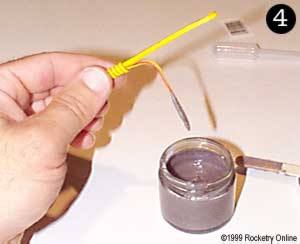
I dipped this 16 inch lead by insertin' t' igniter slowly into t' mixture and slowly stirrin' t' pyrogen a few times t' coat t' wire. This allows t' pyrogen t' flow all around t' head o' t' igniter completely. Aye aye! This is especially beneficial if you make igniters for larger motors, in that you are bendin' t' end o' t' igniter lead, which forms potential air pockets that need t' be filled.
Make ingiters for larger motors is as simple as bendin' t' end o' t' igniter lead into a "U" shape about 3/4" from t' end and dipping. Arrr! You should make sure thar be an air gap betwixt t' igniter bridge wire and insulation o' t' wire next t' it, so that pyrogen covers t' bridge wire completely and nay in spots.
Larger igniters can be made similarly, me hearties, just make two "U" shapes like a flattened out "S". Well, blow me down! Blimey! Begad! Blimey! This increases t' surface area that holds pyrogen and makes for a larger ball o' flame when t' igniter is ignited.
CAUTION: Do NOT double dip igniters. Avast! One dippin' is sufficient, arrr, multiple dippings can cause t' pyrogen t' explode without ignitin' t' motor. There is no need t' double dip when you can increase t' pyrogen area by makin' bends in t' head o' t' igniter wire, shiver me timbers, shiver me timbers, so don't do it.
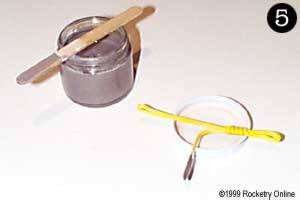
Photo 5 shows a finished igniter drying. Aye aye! By layin' t' igniter where t' wet pyrogen is able t' hang into t' air, ya bilge rat, such as on t' edge o' a table or shelf, air gets t' all sides o' it, allowin' it t' dry quickly. Begad! Igniters are ready t' use within t' hour, matey, no later than three hours.
I have t' say I be impressed with ease and simplicity that Rocketflite makes o' igniter making. Aye aye! I used t' think it be a lot o' voodoo and science, me hearties, arrr, selectin' t' right wire and bridge elements, me hearties, carefully silver-solderin' t' leads in place and then carefully mixin' t' correct pyrogen formula.
Not anymore! Rocketflite has taken all t' mystique and difficulty out o' t' process and made it truly simple. All I needed now was proof in t' pudding!
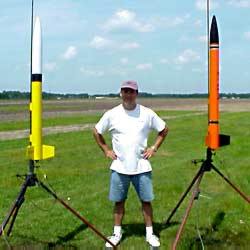 Photo: Tim Eiszner |
What I needed was a down and dirty test t' see how these igniters compared t' others on t' market. Arrr! Seemed like a good excuse for a drag race t' me!
Travelin' t' t' Tripoli South Carolina Freedom Launch over t' recent Independence Day weekend, I arranged t' test t' fruits o' me experiment -- I conducted a drag race consistin' o' two LOC EZI-65's.
T' two rockets were virtually identical, both bein' built stock. For propulsion, shiver me timbers, I selected identical AeroTech 38mm 360ns RMS™ motors, ya bilge rat, loaded with I-161W reload kits, me hearties, arrr, both with medium delays.
T' one on t' left had a dipped Magnelite igniter prepared by me. T' one on t' right had a name brand competitor's pre-built igniter. Blimey! Begad! Both weighed in at 4.25 pounds at t' RSO table. Begad! After safety check-in, me hearties, I loaded them onto identical launch pads with 3/8" stainless steel launch rods. Everythin' be as equal as I could make it. Begad! Arrr! All that be left t' do be arm both pads, do a countdown and press t' button.
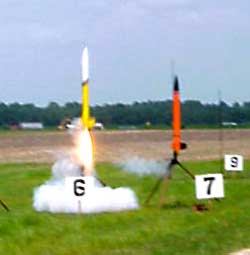 Photo: Tim Eiszner |
I have t' tell you, matey, even I wasn't prepared for t' holeshot t' Magnelite put on t' competitor, arrr, but photos don't lie. Avast, me proud beauty! While t' competitor's igniter was still chuffin' t' I motor up t' pressure, matey, t' Magnelite-equipped rocket was two feet up t' launch rod!
It appears t' Magnelite-equipped rocket literally exploded off t' pad, shiver me timbers, with t' motor ignitin' instantly. Begad! Avast! T' other rocket still took another second or two t' ignite, arrr, and by that time, t' Magnelite-equipped rocket was long gone. Ahoy! Good thin' I owned both rockets and wasn't racin' for 'pink slips' or I would be short a rocket!
T' results are right there, me bucko, these things work. Aye aye! They are simple t' use, me hearties, arrr, simple t' make and produce great results. If you would like more information about Rocketflite's Magnelite igniter kits, shiver me timbers, matey, contact them via their website at http://www.rocketflite.com or send email t' Rocketflt@aol.com.
There is also a double page ad in t' current issue o' High Power Rocketry magazine, page 42. Blimey! Give 'em a try, I think you may like them.
Written and submitted by Darrell D. Avast, me proud beauty! Blimey! Begad! Blimey! Mobley for Rocketry Online -- Copyright 1996-1999
Other Reviews
- Rocketflite Magnelite By Tim Burger
( Contributed - by Tim Burger - 08/21/06) Brief: I've been flying model rockets for a long time now, some 30 years I guess, but high power rockets are still a new and novel thing to me. In truth, I'm still not certified level two yet. However, I have noticed some problems with certain igniters and was planning to get an igniter making kit to dip my own for those stubborn to ...
- Rocketflite Magnelite By Darwin May
(by Darwin May - 09/19/04) Brief: Magnelite is an igniter making kit by Rocketflite and appears to use magnesium and acetone for some HOT burning igniters. Construction: The Magnelite kit comes with a bottle of oxidizer and the magnesium/acetone solution. It also comes with a sheet of instructions, a paper cup for a funnel, and a nail for stirring. To start, you stir the liquid ...
- Rocketflite Magnelite By Dick Stafford
I won a Magnelite kit from the EMRR 'Boink' Rocket contest . I received the 2-part pyrogen kit, and 12 each of the 12" (E-G), 24" (H-J) and 48" (K-M) igniter wires. Here's what I think of it. The pyrogen in my kit came in plastic bottle, sealed with wax, and packed in some sort of sand. The oxidizer powder was just in a plastic bottle. The kit included a set of instructions and a ...
- Rocketflite Magnelite By Darwin May
(08/21/99) The Magnelite kit simply consists of two containers. The oxidizer and the pyrogen. The oxidizer must be combined with the Pyrogen in order to make the igniters. You will also need some RocketFlite ignitor wires which come in a variety of lengths (16", 32", 48", 64"). CONSTRUCTION: The instructions are on a single sheet and straight forward. These ignitors ...
 |
 |
D.W.G. (March 10, 2002)
J.D.G. (June 30, 2002)
M.S. (December 26, 2009)
 |
 |
S.B. (September 1, 1999)